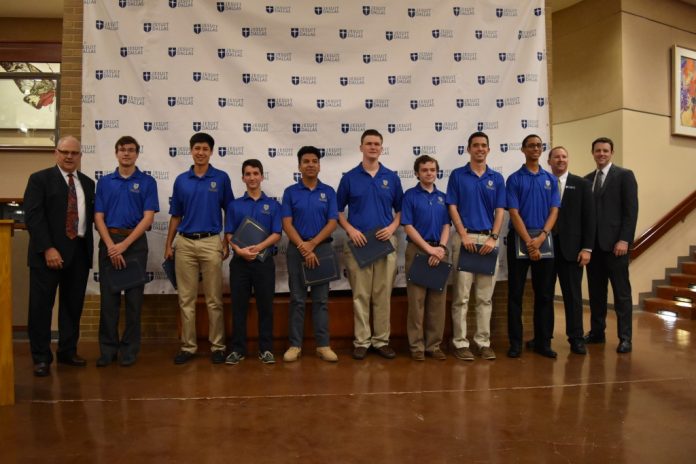Scribbling a large black dot into his answer sheet, the student marks choice “A” on his test. His eyes then glaze over the reading material, searching for any evidence or clues for the next question. Once he locates the relevant section of the article, he then tries to pinpoint the exact words and details that will provide him with the most precise answer. His frantic eyes scour the paragraph over and over again, desperate to find some piece of helpful information as he feels more and more time pass by. Finally, his mind fixates on a brief but significant sentence, and he then bubbles in option “B” on the next question as a subtle smile appears on his face. With this newfound sense of relief, he looks up for a brief moment and notices the digital clock at the front of the room. “10:23. I’m at a good pace,” he mutters to himself while turning his eyes back towards the reading booklet. He then turns the page and begins the same process, repeating it until he has finished the test.
Last year in October, students from all over the nation took the PSAT. The PSAT is a test that provides practice for students who are preparing to take the SAT. This helpful aid is not used to evaluate students by any source, but the scores students receive are recorded.
For freshman and sophomores taking the test, the scores are listed for the sake of providing the student with information on their progress, but for juniors, scores are sent out to colleges for them to look at. Although not evaluated, these scores can actually provide students with many benefits, including the National Merit Scholarships. Students who receive these scholarships usually score extremely high on the test, and they are then recognized by the College Board as National Merit Semi-finalists. Predictably, many students at Jesuit achieved this remarkable accomplishment.
Announced fairly recently, eight students from Jesuit were commended as National Merit Semi-finalists. These scholars include William Henrion ’17, Miles Okamoto ’17, Robert Rota ’17, Manny Ruiz ’17, Jack Schwab ’17, Joe Vance ’17, James Vroom ’17, and Zach Watts ’17. The criteria for this accolade provided a very tough challenge which many of the students worked hard to achieve, but the work was well worth it, providing the students with a well-deserved sense of accomplishment and future benefits. Each student was asked how they prepared for the test, how they feel about being recognized as semi-finalists, and what colleges they’re looking at now.
Most of the students did not do any extra preparation, as was the case for the first six scholars. William Henrion answered, “I didn’t really prepare at all outside of in-class stuff (like SAT words on English vocab quizzes) because I have always been good at standardized testing. I knew I was capable of being a semi-finalist, so actually getting it was a big feeling of validation for me.” Confident and calm, he took the test with relatively no prep, and achieved his goals afterwards. He is looking at “UC Berkeley, Santa Clara, Stanford, UT Austin, University of San Francisco,” and this scholarly recognition will surely aid him in his journey.
Similarly, James Vroom explained that “the only prep I did was through the PSAT practice section of Mr. Patterson’s vocabulary quizzes. Outside of required school practice, I actually did none. I thought Jesuit prepared me very well for the test.”
Just like Henrion, Vroom did not prepare much for the test, but he was able to receive such a high score due to his prior knowledge, which he accredits to his teachers and schooling. Sharing Henrion’s sense of honor, he stated that “I love the idea of being a semifinalist, especially since 15,000 of the 16,000 become finalists. I like those odds. It feels good to have recognition for the work I put into school.” This recognition is well-deserved, and the award will surely help in his college search, which include the schools “Wake Forest, Vanderbilt, and the University of Southern California.”
Like his fellow classmates, Zach Watts “didn’t do any personal preparation for the PSAT. Mostly, the prep that I did was in English, where we took practice tests from previous tests and talked through the solutions in class.”
To Zachary, however, recognition as a semi-finalist came more as an expectation and an affirmation: “I’m relieved being a semi-finalist, knowing that I did well enough on the test. I’ve been told since I was a freshman that it was extremely important to be considered for national merit scholarship qualification.” It looks like he stepped up to this challenge given from others around him, and the achievement will surely have colleges interested in him. Unfortunately, he was not able to provide a list of of the schools he is applying to.
Following the trend, Emmanuel Ruiz also “didn’t prepare outside of the couple of practice questions we did in AP Literature and Composition.” With his natural ability and schooling, he was able to achieve this outstanding accomplishment, and he is “very excited about the scholarship opportunities available for semi-finalists. This excitement is well-founded as many of these scholarships provide generous benefits, which will certainly help his college application process as he is looking at “Georgetown, Columbia, U. Chicago, Emory, Swarthmore, Yale, Princeton, Fordham, and OU.”
With even less preparation than the four previous students, the only thing Joe Vance did before the test was “make sure to get a good night’s sleep before taking the PSAT.” Remarkably enough, it only took the scholar a clear and rested mind to reach a semi-finalist worthy score, and he was thrilled at the possible benefits of the award: “When the cutoff scores leaked online, I saw that my index score was right at the Texas cutoff of 220. Words cannot describe how happy and relieved I felt to be named a semi-finalist, because now I have a shot at becoming a finalist. Many colleges award full ride scholarships to National Merit Finalists.” Even if he does not become a finalist, the recognition will surely grant him many advantages in applying to new schools which include “Vanderbilt and Notre Dame,” his top two choices, and “Texas Tech, Texas A&M, and OU.”
Another one of the semi-finalists working only with his previous knowledge and refreshed mind, Robert Rota “didn’t prepare for the test, I just relaxed and got a good nights sleep.” This minimal preparation got the job done for the student, and he “was very excited.” He further elaborated on this joy, stating, “I know it’s hard to qualify, so I was very happy to see that I did when the cutoff scores came out.” This happiness will likely extend to his college search as it will give him a great change to get into all schools, and he said that he is “mostly looking at UT Austin right now, but we will see what the future has to bring.”
Contrasting these six students who did minimal preparation for the test, Miles Okamoto, while not actually putting forth extra work, reflected on previous practice and created certain test-taking techniques for himself, which he explained: “the best preparation for me, and what I noticed across each year of taking the test, was that I got used to the kinds of questions they asked and the timing of the test and learned more of the required Math skills as I took more advanced Math classes each year. For the new test format, I went in a little bit blind, if you will, just because there was no precedent to what we were going to see. I still felt prepared though, and I thought the changes were helpful in terms of my ability to logically follow the questions and reason out the answer.”
Despite a change in the format of questions on the test, his prior experience, natural aptitude, and an extension of his tactics lead him to ace the test, and from this, he was “honored to be named a semifinalist and to be a part of the 7 other guys in his class representing Jesuit on the list of state semifinalists. With this achievement, he is “looking at applying to Stanford, Vanderbilt, UT, Northwestern, and Santa Clara University.”
Finally, putting forth the most preparation, Jack Schwab practiced diligently for the test, which he described, “I prepared through tutoring. I learned to understand and systematize my answers to questions in order to always have a response ready and stick to a consistent strategy throughout.”
This systematic approach, so to speak, led Jack to achieve his goals, and he shared his thoughts on the accomplishment and its importance in his life: “It means being a success. Oftentimes, we don’t often get to look outwardly from Jesuit and see how we compare to other people. But it means, to put it simply, that I’m among the best of the best in that regard. Just like only 1% of high school athletes make it to college ball, only 1% of test takers get National Merit and for someone who ‘ain’t no good’ on the field, it’s nice to be recognized for accomplishments in my domain.”
Satisfied with the accolade which he achieved through his personal strengths, Jack felt a sense of honor from such high recognition, and the rewards of such recognition will surely aid him in the future as he is “looking at Columbia, the University of Chicago, University of Virginia, and UT.”
Overall, although most students did not put forth great amounts of preparation for the test, the importance of being recognized as a semi-finalist and the esteem it grants is well evident in their responses. Additionally, the varying methods of preparation highlight the fact that all students possess different levels of aptitude and pre-requisite knowledge coming into the test, so the amount of work put in does not necessarily reflect the results each individual will receive.
These conclusions provide an important lesson for all current and future students at Jesuit: the recognition as a National Merit Semi-finalist provides tremendous benefits to a student’s future, and everyone, regardless of their own perceived academic ability, should strive for this accolade and discard the apathy they may have when taking the test, whether they are a freshman, sophomore, or junior.
Thanks to Katie Kinsley for the photo.






